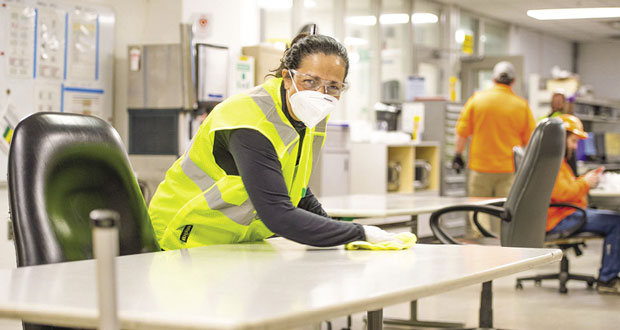Research across FM, healthcare, education, manufacturing and food service sectors into attitudes on going back to the workplace by Kimberly-Clark reveals that when it comes to wellbeing, infection control remains the number one priority
The Coronavirus pandemic has moved wellbeing, hygiene and safety to the top of everyone’s agenda especially when you consider that COVID restrictions keep changing and continuing . The levels of concern about the safety at work or education, visiting hotels, using airports, or dining out, vary considerably and facilities managers in all sectors need to learn from this unprecedented event to design and maintain premises for the future that are measurably more hygienic and safer.
With heightened awareness around risk, reinforced daily by the need for social distancing and the wearing of face coverings, managing consumer perceptions of cleanliness and hygiene is key to restoring and maintaining confidence for employees and customers across all sectors.
“As the leaders in workplace hygiene, we commissioned Harris Interactive to discover how people really felt about about returning to work during the first Coronavirus lockdown,” says Olena Neznal, Vice President, Kimberly-Clark Professional EMEA. “The survey found that 80 per cent of people are now more aware of hygiene practices when outside the home. The survey also showed that three out of four people in the UK do not feel safe going back to the workplace, while 86 per cent said they would avoid a location if they didn’t think it was COVID-secure.
“Businesses need to ensure that their employees and visitors feel safe,” adds Neznal. “Companies need to balance the responsibilities of keeping everyone safe and staying up to date with the latest protocols, whilst getting back on track. The findings from the survey are crucial in guiding our ability to ensure we offer the best advice and solutions.
“Only businesses which win the confidence of their employees and customers will thrive, and from this research it is clear that hygiene is now top of the business agenda. There are no shortcuts to workplace hygiene – we need to cover every angle.”
PERCEPTIONS OF CLEANLINESS AND HYGIENE
The survey looked at various sectors including offices, airports, hotels, education locations, dine-in restaurants, cafés, pubs and bars, and perceptions about overall levels of cleanliness and hygiene varied considerably from sector to sector. Only 18 per cent of respondents were confident with the overall levels of cleanliness and hygiene in hotels, while airports were lower at only 16 per cent. For offices that fell to 13 per cent, and for dine-in restaurants, cafés, pubs and bars, confidence was lowest at only 11 per cent. For educational establishments, the assessment was considerably better at 28 per cent.
The survey asked who would avoid visiting a location if it wasn’t COVID-secure, and only 35 per cent said they would feel safe in a public washroom. Meanwhile, only 45 per cent said they would feel safe visiting an airport, with a similar 46 per cent saying they would feel safe in dine-in restaurants, cafés, pubs and bars.
In each sector, washroom hygiene was a cause for concern. When asked ‘what are the most important areas to improve hygiene in an office building?’, 89 per cent said the washroom is a key area where businesses can do more, suggesting that a great deal needs to be done to improve facilities.
In public washrooms, the confidence levels of cleanliness and hygiene was very low, at an alarming seven per cent. Eighty-three per cent of respondents said they were concerned about using toilets, and the top factors when considering if a public washroom was safe to return to were seeing the washroom is clean (76 per cent) and seeing employees actively cleaning (74 per cent). Asked if a restaurant washroom was a reflection of the hygiene standards of the rest of the establishment, 78 per cent thought it was, while 76 per cent thought that the condition of the washroom was a reflection of how much the establishment cared about its customers.
With safety in mind, the survey asked which facilities people would prefer to see in washrooms. In every sector, hand sanitiser and anti-bacterial soap were among the highest priorities. In airports, touchless taps were top of the list (71 per cent), followed by touchless automatic doors (65 per cent). People had similar views when considering restaurants and hotels while for the education sector it was not rated as highly.
PRIORITISING SURFACE WIPING OF FREQUENTLY TOUCHED SURFACES
While washroom hygiene remains a top priority, hotspots now also need to be considered. The guidance from the World Health Organisation is to use a 2-step Clean and Disinfect process. The recommendations are to routinely clean and disinfect all frequently touch surfaces in the workplace such as workstations, handrails, doorknobs and shared equipment. Science indicates why these surfaces need daily hygiene protocols in addition to good hand hygiene standards in facilities .
The survey showed varying levels of concern around germ hotspots. When away from home, 70 per cent were worried about touching the railings on public transport, while 67 per cent were concerned about opening doors or touching lift buttons. Unsurprisingly, as there has been a significant shift towards contactless payments, 65 per cent were worried about using cash machines and 64 per cent in handling money.
360˚ HYGIENE & PROTECTION PROGRAMME
To help businesses get back on their feet and restore confidence, Kimberly-Clark Professional has introduced the 360˚ Hygiene & Protection programme.
The 360˚ programme offers specific premises support through considering need areas, and tools to assess their premises and identify germ hotspots. The next step is implementing cleaning and disinfecting protocols and introducing the correct hand hygiene and surface wiping solutions. Finally, Kimberly-Clark Professional promotes hygienic workplace practices by providing communication tools to help create awareness, which is a vital and important part of making people feel safe. An in-depth workplace guide is available for each sector advising the most appropriate products and solutions. https://home.kcprofessional.com/uk/hygiene-resources
A free, no obligation virtual hygiene walk – bookable through the microsite https://home.kcprofessional.com/UK_PR_TTNS_0920 – reviews a facility and provides expert guidance on cleaning and hygiene protocols, recommending the right product solutions to tackle key hygiene hotspots.
“Reassuring customers and employees with visible hygiene actions has never been more important for a business’ survival,” says Neznal. “The results of our survey provide insights into priorities and areas for improvement to make the premises and washrooms of the future, safer.”





